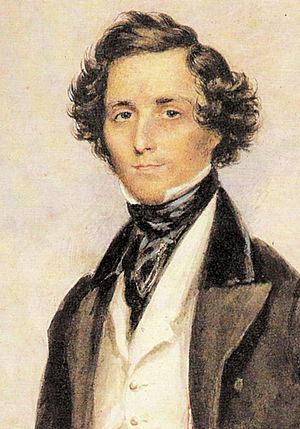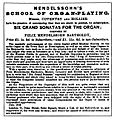Felix Mendelssohn facts for kids
Jakob Ludwig Felix Mendelssohn Bartholdy (born in Hamburg on February 3, 1809; died in Leipzig on November 4, 1847) was a famous German composer.
He was one of the greatest composers of the Romantic period. He loved the music of older composers like Bach, Handel, and Mozart. Mendelssohn was a child prodigy, meaning he was incredibly talented at a very young age. He was already writing amazing music as a teenager.
Felix Mendelssohn wrote music for orchestra, piano, organ, chamber music (music for small groups of instruments), and music for singing. His violin concerto is one of the most popular concertos ever written. Many famous violinists play it. You might also know two of his tunes: the hymn Hark the Herald Angels Sing and the Wedding March, which is often played at the end of weddings.
Contents
Early Life of a Musical Genius
Felix Mendelssohn was born in Hamburg on February 3, 1809. His father, Abraham Mendelssohn, was a banker. His grandfather was the famous German Jewish philosopher Moses Mendelssohn.
In 1811, his family moved to Berlin. They had to leave Hamburg secretly because they were worried about the French army. Felix was the second of four children. His older sister, Fanny, was also a very talented musician and composer. However, at that time, it wasn't common for women to have a professional music career. So, Fanny remained a talented musician but didn't work professionally.
Felix was taught by private tutors at home. He learned to play the piano from Ludwig Berger. He also studied music theory and composition. When he was nine, he played the piano in a concert. He also started composing small musical plays called Singspiels.
Adventures and Achievements
The Mendelssohn family often held private concerts at their large home on Sunday mornings. Many important and famous people were invited to these special events.
In October 1825, Felix wrote a String Octet. This is a piece for eight string instruments, and it's considered one of his best works. He also deeply studied the music of Johann Sebastian Bach, whose music had been mostly forgotten. In 1829, Mendelssohn conducted a performance of Bach's St Matthew Passion. This performance was very important because it helped people realize how great Bach's music was. Since then, Bach's music has always been remembered and loved.
Between 1829 and 1835, Mendelssohn traveled a lot around Europe. He visited London several times and performed Beethoven’s Emperor Concerto there. He also traveled to Scotland. While there, he visited Fingal’s Cave in the Inner Hebrides. This trip inspired him to write a famous overture called The Hebrides.
After his travels, he spent some time in Düsseldorf. He performed several oratorios (large musical works for choir and orchestra) by Handel and his own music. In Frankfurt am Main, he met Cécile Charlotte Sophia Jeanrenaud. They married in 1837 and had a very happy marriage with five children.
Felix and Cécile moved to Leipzig, where he became the conductor of the famous Leipzig Gewandhaus Orchestra. This was one of the most important musical jobs in Germany. He conducted many pieces by 18th century composers who had been forgotten. He also conducted the first performance of Schubert's Symphony in C major, which had been found by Robert Schumann after Schubert's death.
Mendelssohn invited many famous musicians to perform with the orchestra in Leipzig. These included Clara Schumann, Franz Liszt, Anton Rubinstein, the young violinist Joseph Joachim, and the Swedish singer Jenny Lind. Mendelssohn made the orchestra much better, turning them into one of the best in the world. He also made sure the musicians were paid well.
In the early 1840s, Mendelssohn spent time in Berlin. The new king, Friedrich Wilhelm IV, wanted Mendelssohn to be in charge of new concert plans. The king wanted to see Greek plays performed, and Mendelssohn wrote special music, called incidental music, for performances like Antigone.
In June 1842, Queen Victoria invited Mendelssohn to her palace in London twice. Mendelssohn showed his thanks by dedicating his Scottish Symphony to her. He continued to conduct in Leipzig and helped make Hector Berlioz's music famous in Germany. He also became the director of the new Conservatoire (a music school) in Leipzig. In Berlin, the king asked him to write incidental music for Shakespeare's play A Midsummer Night’s Dream. He had already written some of this music years earlier, but he finished it and performed it in 1843.
During his last years, Mendelssohn's health was not good. He kept working and traveling as much as he could. However, after a stroke in 1849, he died in Leipzig at the age of 38. His body was taken by a special train to Berlin, where he was buried near his sister Fanny.
Mendelssohn's Music
Mendelssohn wrote many famous pieces. His most well-known works include his five symphonies, especially the Scottish and Italian symphonies. His violin concerto is also very popular. Other famous pieces are his overtures, like The Hebrides, and his Incidental Music to A Midsummer Night’s Dream, which includes the famous Wedding March.
He also wrote excellent chamber music, such as string quartets and piano trios. His two very famous oratorios are Elijah and St Paul. For the piano, he wrote a large collection of short pieces called Songs without Words (German: Lieder ohne Worte), which many pianists enjoy playing. His organ music shows his love for J.S. Bach, often sounding more like Baroque music than Romantic music.
After his death, Mendelssohn’s music became less popular for a while. However, many great musicians recognized his talent, and today his music is very much loved and performed around the world.
Images for kids
-
First page of the manuscript of Mendelssohn's Octet (1825) (now in the US Library of Congress)
-
View of Lucerne – watercolour by Mendelssohn, 1847
-
Trumpet part (top) and the main theme in the violin part (bottom), of the "Wedding March" from Mendelssohn's Op. 61
-
Part of the overture to Elijah arranged by Mendelssohn for piano duet (manuscript in the Library of Congress)
See also
 In Spanish: Felix Mendelssohn para niños
In Spanish: Felix Mendelssohn para niños












